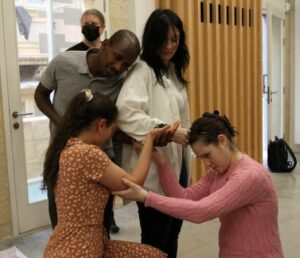Written by: Valentina Delconte, Flora Brégeon
In its third edition, the SciCultureD intensive course brought 26 participants from diverse backgrounds, disciplines, experiences and expertise together in the heart of the Mediterranean Sea: Valletta, Malta, at the Valletta Design Cluster.
With increasing dwellers and urban growth, European cities store the potential to become hubs for sustainable development: our course explored the role that communities – i.e. residents, tourists, businesses, locals and expats, etc… — play in shaping greener, more inclusive and just cities.
The course kicked-off with our participants exploring the Maltese context from an historical and cultural perspective, touching upon Malta’s colonial past thanks to Dr Charles Xuereb (writer and lecturer), learning about travel behaviour in cities thanks to Karyn Scerri (PhD & researcher at the University of Malta), and discovering local placemaking initiatives with a workshop by Dr Wendy Jo Mifsud and Sarah Sciberras (Dawra Madwarna). Additionally, the stakeholder engagement workshop led by Emma Clarke (VARCITIES project – University of Malta) further explored how environmental and social challenges affect urban communities.
The team work during the initial workshops fostered an atmosphere of trust, empathy and listening among participants, enhancing cross-disciplinary collaboration and critical thinking. These aspects are at the heart of Design Thinking, the approach used by the SciCultureD team to value innovate ideas and generate impactful response to ‘wicked’ challenges.

The creative ideas of our participants showed that it is possible to integrate people’s wellbeing, nature coexistence, and economic sustainability in cities such as Valletta: the responses shared at the end of the course emphasized the creative and diversified use of urban spaces, paying particular attention to the physical, cultural, and social identities that define a city and that support its ongoing evolution. Community-based participation was proposed as part of effective urban ‘placemaking’, suggesting activities that encourage an inclusive reimagination process of public and private spaces to steer a sense of belonging and care.

It was an
extraordinary learning adventure for all of us:
the final art-based performances demonstrated that our learners had much
to teach us too. Their inspiring ideas and innovative collaborations opened up
the gates of Valletta to a greener, more inclusive and just future.

